On the back of the negotiating flashpoint that led to the departure of Tom Flegler, Brisbane must now confront some critical roster decisions. PETER BADEL and TRAVIS MEYN put the Broncos’ roster and salary cap under the microscope.
Brisbane bosses will review $7 million worth of player contracts over the next two seasons as the Broncos face searing pressure to snap the club’s 19-year premiership drought.
With the Broncos digesting the pain of another failed season, a special investigation by this masthead can reveal the negotiating flashpoint that led to the bombshell departure of their grand final enforcer Tom Flegler.
Brisbane’s recruitment-and-retention committee will confront some critical roster decisions, with 19 top-liners coming off contract in 2025-26, including the big four of Kotoni Staggs, Selwyn Cobbo, Adam Reynolds and Payne Haas.
But it was the loss of Flegler this season that represented a $3 million kick in the guts for the Broncos, having roster ramifications that will resonate well beyond their finals fade out in 2024.
TOUGH PROP-OSITION
For all the injuries the Broncos sustained this season, the singular presence they missed most was Flegler.
Every serious title contender needs a standover man. Yes, Payne Haas, Brisbane’s five-time Paul Morgan Medallist, commands respect across the code for his unrivalled fitness and monstrous workrate.
But Flegler was Brisbane’s muscle. He complemented Haas beautifully. It was his aggression, intimidation, presence and scintilla of madness that underpinned the Broncos’ charge to last year’s grand final against the Panthers.
Flegler and Haas should have been Brisbane’s Twin Towers for the next decade.
Instead, Flegler’s departure to arch rivals Redcliffe, headlining an exodus including Herbie Farnworth (Dolphins), Keenan Palasia (Titans) and Kurt Capewell (Warriors), put enormous pressure on Broncos hierarchy to purchase prudently.
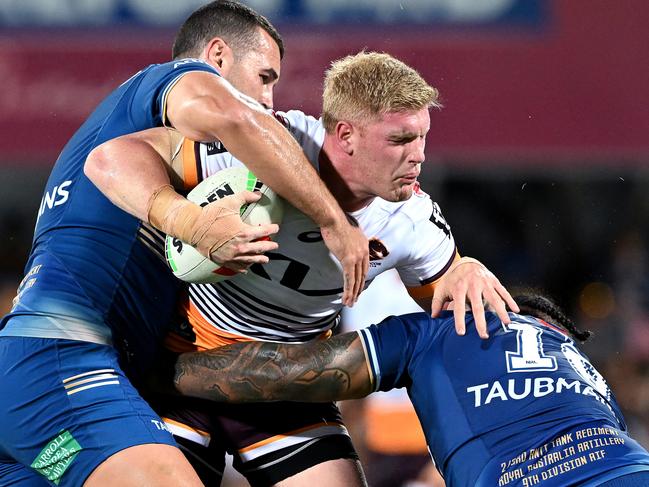
BUYER BEWARE
Their 2024 recruitment drive – netting Fletcher Baker, Jaiyden Hunt, Josiah Karapani and Jack Gosiewski – turned out to be an abject disaster.
Baker, poached from the Roosters to replace Flegler, was a resounding flop. He spent half the season languishing in the Queensland Cup.
Dragons import Hunt, a back-rower, played just five NRL games. Souths recruit Karapani was a backline back-up for 10 games and Gosiewski, a mid-season arrival from the Cowboys, started once before suffering a season-ending broken arm.
While Flegler played just four games this season for the Dolphins due to a nerve problem in his shoulder, no-one could have foreseen the fate that befell him at Redcliffe. Regardless, his void at Red Hill left the Broncos exposed upfront. Haas felt the pinch without him.
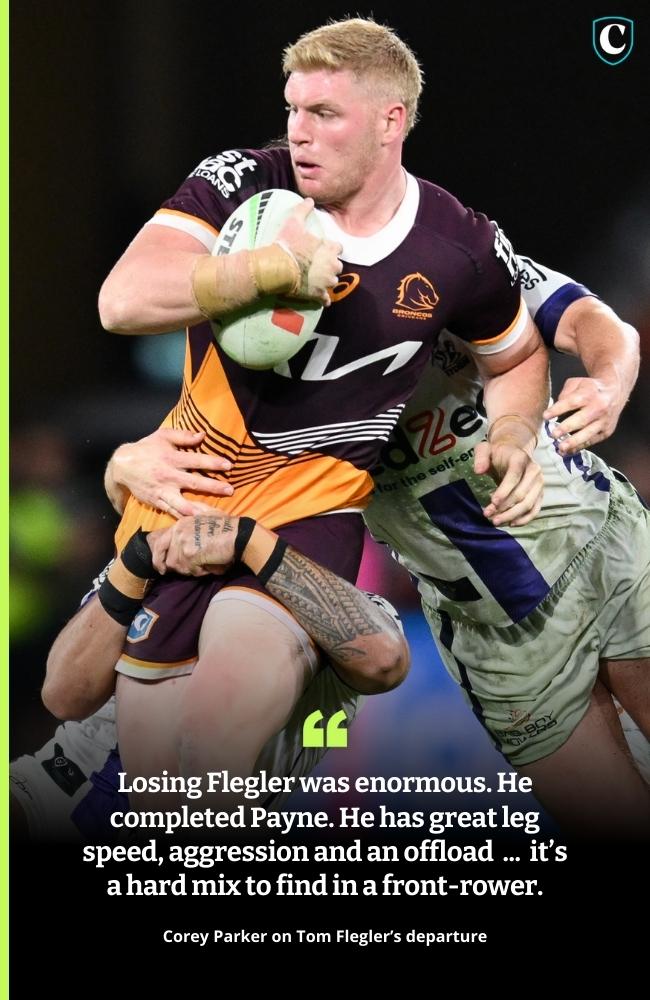
“The Broncos had to identify that they needed to bolster some positions and they didn’t. That’s a concern,” said former Broncos skipper Corey Parker.
“Losing Flegler was enormous. He completed Payne. He has great leg speed, aggression and an offload and when you put all that together, it’s a hard mix to find in a front-rower.
“Fletcher Baker was a big signing from the Roosters to replace Flegler, but why all of a sudden is he no good?
“They also signed fringe first graders like Jaiyden Hunt and Gosiewski … I’m not sure where those guys fit in the Broncos team.”
BENNETT’S HAMMER BLOW
Brisbane fought hard to retain Flegler. Wayne Bennett’s Dolphins always had the salary-cap funds to trump the Broncos in a bidding war.
One powder keg meeting was the moment that cost Brisbane any hope of keeping one of their best front-row talents since Shane Webcke.
Flegler and his management were called to a contract meeting early last season. Negotiations were amiable until Broncos tabled their offer Flegler. It was only a slight increase on his $650,000-a-season deal. Flegler was privately fuming. The parties were at loggerheads over his value. Checkmate Dolphins. The Maroons enforcer signed a four-year deal worth $3 million with Brisbane’s expansion rivals and Dolphins coach Wayne Bennett reminded the Broncos of the rare talent they had lost, claiming Flegler could usurp Haas as the front-row kingpin of the NRL.
“I couldn’t believe our lucky stars we got him,” Bennett said.
“Tom finished that year (2023) as one of the top forwards in the game and the beauty is he still has a decade in front of him.
“It’s taken a little bit of time for him to mature, but he is a player that is going to put his stamp on the game in the next few years.”
Flegler, Capewell, Farnworth and Palasia were members of Brisbane’s 17-man grand final squad. Broncos CEO Dave Donaghy concedes their departures were felt on and off the field this season.
“Those guys are all quality players,” Donaghy said. “I think we certainly lost some on-field leadership or player leadership with some of those guys, especially with Tom and Kurt.
“But that’s the difficult part of managing your roster in line with your salary cap.
“It’s really, really hard to keep a grand-final team together.”
THE IKIN BOMBSHELL
Eight weeks after Flegler signed with the Dolphins, the Broncos were hit by another major ruction - the unexpected departure of football boss Ben Ikin.
When Ikin signed with the Broncos on June 28, 2021, it was trumpeted as the front-office masterstroke that would give coach Kevin Walters a sharp, savvy and cerebral ally in a one-two punch to deliver Brisbane’s seventh premiership.
After all, the Ikin-Walters alliance had been successful before. They were Brisbane’s halves pairing in the club’s title win in 2000.
Ikin and Walters seemingly had a formidable simpatico. The ‘Kev-olution’ was rolling.
With Ikin diligently constructing the bedrock of Brisbane’s football program to give Walters the resources he craved, the Broncos went from last under Anthony Seibold, to 14th, to ninth in the space of two seasons.
On May 5, 2023, the Broncos flogged Manly 32-6 on the Magic Round weekend at Suncorp Stadium. Brisbane had surged to first. Top of the league. The Walters-Ikin partnership looked every bit the title-winning cocktail.
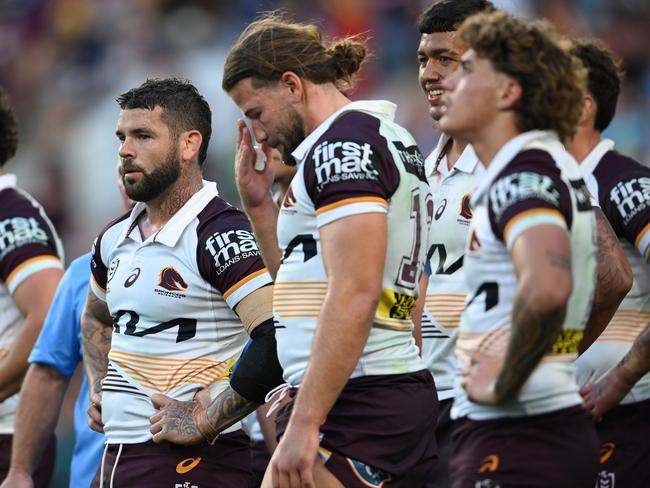
Three days later, Ikin dropped a bombshell on the club. He was gone. His tenure lasted less than two years. After 679 days in the job, Ikin announced he was resigning to become chief executive of the Queensland Rugby League.
Mindful of Brisbane’s position as ladder leaders, neither Ikin nor Walters wanted to rock the boat publicly. But privately, the pair never quite jelled.
While it was never toxic, there were creative tensions between Ikin and Walters, who both wanted premiership success for the Broncos, but had conflicting ideologies on how to arrive at the promised land.
Ikin wanted to implement a football program with the rigour to stand the test of time, much like Craig Bellamy’s system at the Storm.
Walters, as coach, felt it was his football department and the buck should stop with him.
Adding to the tension, Ikin was removed at one point from sideline communication duties by Walters and given a role with Brisbane’s NRLW team. The creative tensions had become untenable. Reluctant to destabilise a winning team, Ikin hit the eject button. The QRL CEO’s post seemed a natural fit.
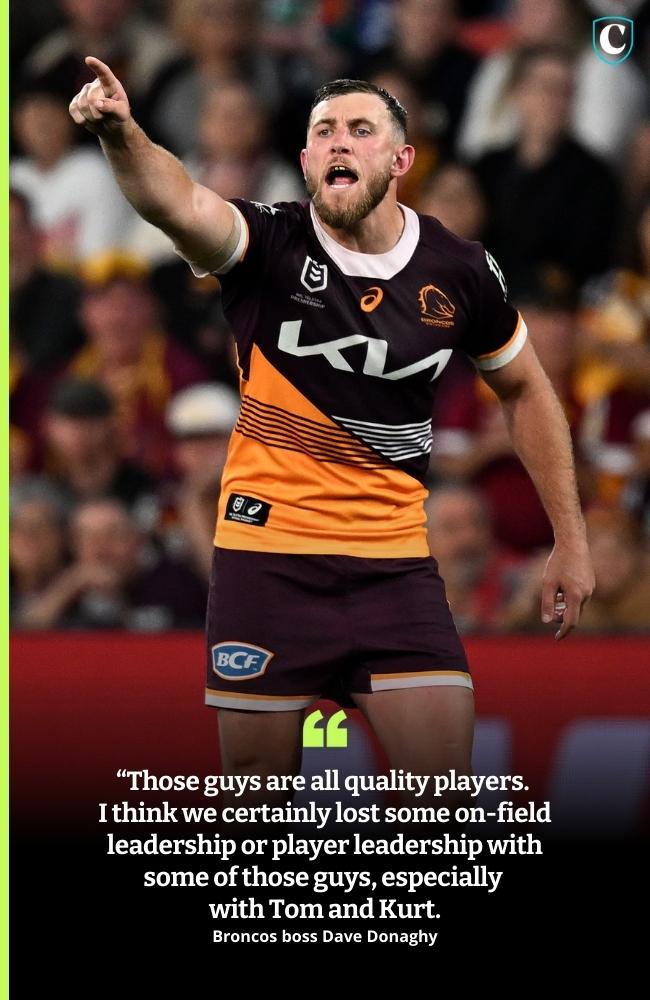
“There was this period where Kevvie and I were coming at the same thing, the same problem, in the hope to find the safe solution but just coming from different sides,” Ikin recalled upon his departure last year.
“So we challenged each other.
“There were a lot of robust conversations and then two years in the footy program – which was clearly in better shape than what it was – kind of then had to be finished up, (and) had to happen in Kevvie’s image, not in mine.
“He’s the head coach. The short answer is that I came in expecting to do a certain number of things and some of those things dropped off.
“The end result is Kevvie, Dave (Donaghy) and I will leave on good terms and the Broncos are in pretty good shape.”
FRONT-OFFICE RUCTIONS
Ikin’s absence is now being felt enormously.
His successor, former QRL staffer Joe McDermott, hired by Walters, operates in a more simplified, diluted role as football manager.
Ikin’s view was that the football boss should exist to minimise the white noise and stresses to allow the coach, in this case Walters, to focus purely on his job. Veteran Storm general manager of football, Frank Ponissi, has been a brilliant and trusted ally for Bellamy for 17 years in Melbourne.
Without Ikin, Brisbane’s football program has been tested this season by adversity, adding to the strain on Walters, who has had to confront a salary-cap crunch, engaging in delicate negotiations to keep the club’s best players.
In February, Walters met with Tevita Pangai Jr at the club’s $27 million headquarters. He raised the prospect of the controversial prop, who had quit rugby league to take up boxing, returning to the Broncos club that offloaded him in 2021.
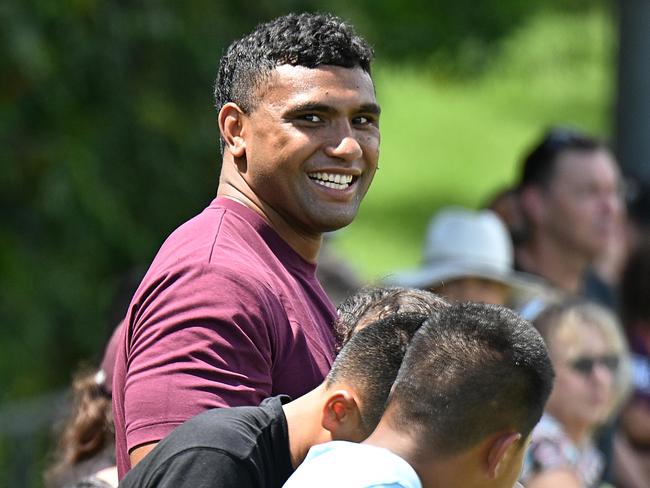
Pangai Jr was keen. He told Walters he didn’t care about a big offer. He just wanted to return to his beloved Broncos. Pangai Jr had the support of senior trio Payne Haas, Pat Carrigan and Adam Reynolds, who urged Walters to sign the former NSW Origin enforcer.
Pangai Jr offered to play for the Broncos this season for $150,000. Instead, Brisbane opted to use that money to sign Gosiewski, who has amassed 74 games in nine seasons and been offloaded by four other clubs.
Walters now has other headaches.
Superstar fullback Reece Walsh becomes a free agent on November 1. The Broncos are confident they will secure Walsh to a five-year, $5.5 million deal, but the extension has yet to be announced, 88 days away from NRL rivals being able to lodge formal offers.
CAP CONCERNS
Brisbane’s salary cap spending is under the microscope.
They have four hookers on their books, including out-of-favour Cory Paix, who is off-contract next year and currently playing Queensland Cup on $300,000 a season.
Lock forward Kobe Hetherington, given permission to negotiate with rival clubs, is a bench player at Brisbane on an estimated $400,000 this year.
Strike duo Kotoni Staggs and Selwyn Cobbo, who started the season as Brisbane’s centre pairing, are both off-contract next year and take up $1.3 million between them this season.
Contrast this with the cap structure of current minor premiers Melbourne and Brisbane’s grand final nemesis last year, the Panthers.
The Storm outlay 32 per cent of their $11.6 million salary cap on four players in their spine, Cameron Munster ($1.15m), Ryan Papenhuyzen ($940,000), Harry Grant ($850,000) and Jahrome Hughes ($830,000), who earn a collective $3.77m.
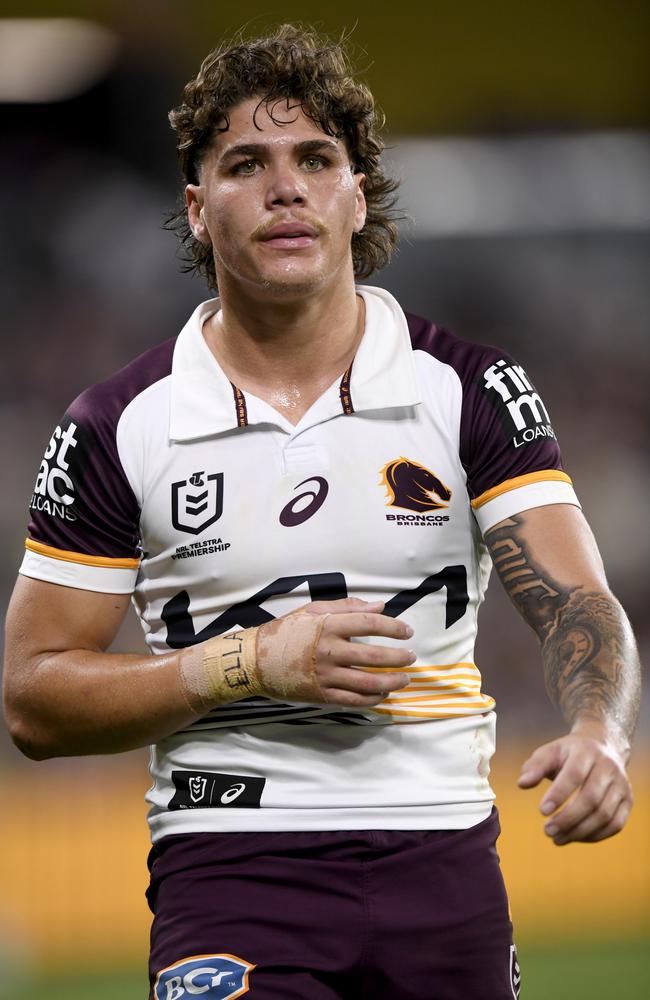
Penrith’s star trio Nathan Cleary ($1.2 million), Wests Tigers-bound Jarome Luai ($750,000) and fullback Dylan Edwards take up $2.59 million. NSW Origin sensation Edwards, on $640,000 this year, earns less than Staggs.
The Broncos’ first-choice spine this year – Walsh, Ezra Mam, Adam Reynolds and Billy Walters – are valued at a total of just $2.2 million this year, suggesting Brisbane are spending too much money in the wrong areas.
Over the next two years, two-thirds of their squad will face contract reviews, including Cobbo, Staggs, skipper Reynolds, Walters, Jesse Arthars and superstar prop Payne Haas, the club’s highest-paid player on $1.1 million.
Reynolds is expected to retire next year, by which time most of the funds from his $800,000 deal will be diverted to the monster upgrade for ‘Reece Lightning’.
By then, Walsh and Haas will be the one-two punch in Brisbane’s millionaire’s club.
Whether those two can combine to snap the longest premiership drought in the Broncos’ proud history is the $1 million question.

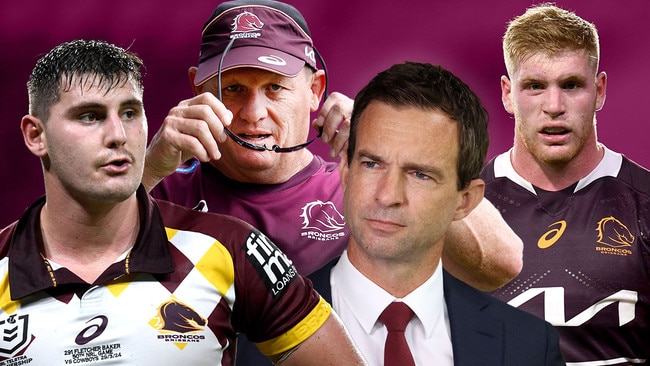
Add your comment to this story
To join the conversation, please log in. Don't have an account? Register
Join the conversation, you are commenting as Logout
New NRL judiciary powers not ‘intervention’
After an outcry over new powers to regulate player behaviour, the NRL boss has moved to calm things down.
Shock Broncos signing leaves Cobbo’s Red Hill career on brink
Selwyn Cobbo’s Broncos career is on the brink of ending after Brisbane announced the acquisition of a Melbourne Storm flyer.